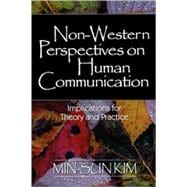
Note: Supplemental materials are not guaranteed with Rental or Used book purchases.
Purchase Benefits
What is included with this book?
| I. INTRODUCTION | |
| 1. "Who am I?": Cultural Variations in Self-Systems | |
| Evolution of Western Self-Construction: "America's Civil Religion" | |
| Interdependent Self-Construals-An Alternative Framework | |
| 2. Independent and Interdependent Models of the Self as Cultural Frame | |
| 3. Why Self-Construals are Useful | |
| Parismony of Explanation: Impact of Culture | |
| Cultural Relativity of Communication Theories | |
| ii. CULTURAL RELATIVITY OF COMMINCATION CONSTRUCTS AND THEORIES: "U.S.- CENTRISM" | |
| 4. "Communication Apprehension": "Deficiency" or "Politeness"? | |
| Motivation to "Avoid" Verbal Communication | |
| Traditional View: Communication "Avoidance" as a Deficiency | |
| Communication Avoidance Stemming from a Sensitivity to Social Contexts | |
| Implications | |
| 5. Motivation to "Approach" Verbal Communication: Is Communication Approach Always Healthy? | |
| Assertiveness: "Standing up for your own Rights" | |
| Argumentativeness: A Subset of Assertiveness | |
| Critique and Summary | |
| 6. Conflict Management Styles: Is Avoidance Really a "Lose-Lose"? | |
| Prior Conflict Management Typologies | |
| Individualistic Bias in Past Conceptualizations of Conflict Styles | |
| 7. Cognitive Consistency: A Cultural Assumption? | |
| Fundamental Assumptions of Cognitive Dissonance Theory | |
| Is Cognitive Dissonance a Culture-Bound Concept? | |
| 8. Attitude-Behavior Consistency: Cultural Ideal of the Individualistic Society | |
| Predicting Behaviors: Deemphasizing Situations Over Attitudes | |
| Emphasizing Other Sources of Behavior | |
| 9. Susceptibility to Social Influence: Conformity or "Tact"? | |
| An Eco-Cultural Explanation of Conformity | |
| Conformity as "Social Sensitivity," Independence as "Insensitivity" | |
| 10. Internal Control Ideology and Communication: Are Internals "Good Guys" and Externals "Bad Guys"? | |
| Internal Control Ideology | |
| Relationship between Locus of Control and Communication Ideology | |
| 11. Deceptive Communication: Moral Choice or Social Necessity? | |
| Deception as a Moral Issue: Independent Perspective | |
| Deception as a Social Necessity: Interdependent Perspective | |
| 12. Self-Disclosure: Bragging vs. Negative Self-Disclosure | |
| Motivational Influences on Styles of Self-Disclosure | |
| 13. Silence: "Is It Really Golden?" | |
| Silence as Malfunctioning of (Human) Machines | |
| Neglected Component of Human Communication: Silence | |
| 14. Acculturative Communication Competence: Who Bears the Burden of Adjustment? | |
| Assimilation Model: "Marginal Man [sic]" Perspective | |
| Alternation Model: Bicultural Perspective | |
| Host Communication Competence: One-Way Assimilation | |
| Bicultural Communication Competence: Alternation Model | |
| III. TOWARDS A BI-DIMENSIONAL MODEL OF CULTURAL IDENTITY | |
| 15. The Sources of Dualism: Mechanistic Cartesian Worldview | |
| Bias Toward "Yang" Communication Behaviors | |
| Particle/Wave Paradox: Implications of Personhood for Human Communication | |
| 16. Dimensionality of Cultural Identity | |
| Unidimensional Model of Self-Construals | |
| Bi-dimensional Model of Self-Construals | |
| Support for the Bi-dimensional Model | |
| Formation of Bicultural Identity | |
| IV. CONCLUSION-TOWARDS MODELS OF MATURITY | |
| 17. Into the Future: Implications for Future Inquiry | |
| Postscript | |
| References |
The New copy of this book will include any supplemental materials advertised. Please check the title of the book to determine if it should include any access cards, study guides, lab manuals, CDs, etc.
The Used, Rental and eBook copies of this book are not guaranteed to include any supplemental materials. Typically, only the book itself is included. This is true even if the title states it includes any access cards, study guides, lab manuals, CDs, etc.